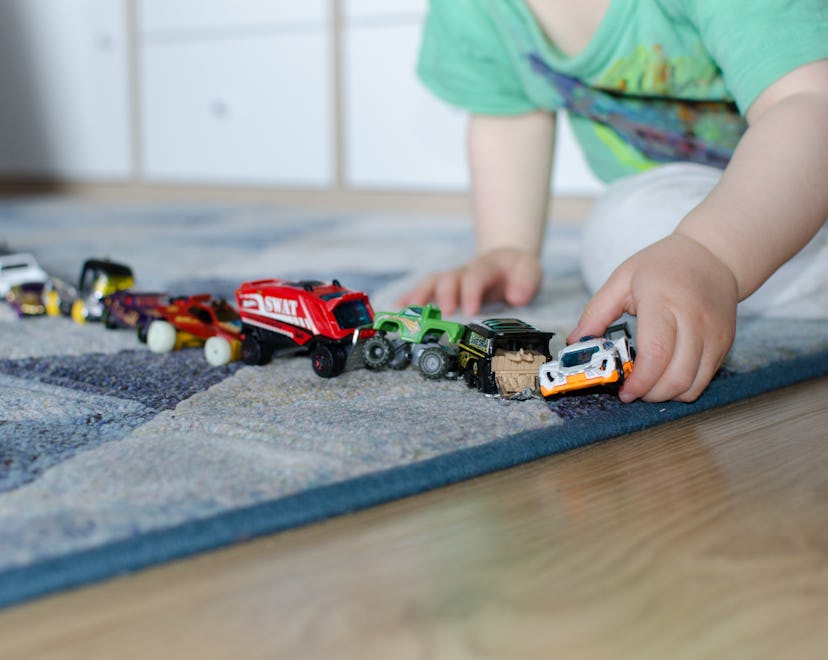Child Development

Why Do Toddlers Line Up Toys? Experts Explain This Classic Toddler Behavior
It’s (likely) that whole “developmentally normal” thing again.
You really can’t Google anything these days as a parent without having all of the worst-case-scenario information pop up on that list. At least I can’t. I was simply wondering why my toddler lines up toys — he likes to line up his blocks and sort them by color — and the internet led me down a rabbit hole of lining up toys and autism, obsessive compulsive disorder, and more. To be fair, I’m not one of the calmest people on the planet, and my anxiety makes me go immediately to worst-case-scenario. But if your toddler lines up toys all day long (as mine does) and seems to enjoy sorting and organizing toys, too, you need to know it isn’t necessarily a red flag.
Is it normal for a toddler to line up toys?
In short, toy sorting and lining up toys is extremely normal toddler behavoir. Any toy sorting is just your toddler figuring out their environment and how different things fit together, explains Dr. Gina Posner, a pediatrician. “Their brain is trying to figure out how different objects fit together, whether by color, shape, texture, etc.,” Posner explains.
Is lining up toys a sign of intelligence?
OK, so now that you’re breathing a little more easily about the idea that lining up toys is not a sign of autism, you may be wondering if your little toy sorter is, perhaps, just a little above average, then? Admittedly, it is pretty impressive to watch those tiny hands patiently line up all 108 of their Hot Wheels cars according to the type of wheels they have. And while it may not necessarily mean your toddler is a genius, Posner says this act of sorting is definitely a positive thing in most children and is good for their cognitive development. When toddlers are figuring out which toys are similar and which are dissimilar, they are indeed using a lot of “toddler brain-power,” says Dr. Daniel Ganjian, pediatrician.
What does it mean when my toddler lines things up? What does it mean if they don’t line up toys?
On the other end of the spectrum, however, there’s no need to be concerned if your toddler doesn’t sort toys, and both Posner and Ganjian agree on this. “It is a good skill, so getting sorting toys can help work their brain, but if they don’t sort them, I wouldn’t be concerned,” Posner says. In fact, many “advanced” children do not like sorting toys, Ganjian adds. He says that between the ages of 2 and 3, you’ll start to notice your child figuring out how to sort colors and shapes.
Recommended sorting toys that help toddlers with this skill, according to Posner, include blocks of different shapes and colors. “The simpler the toy, the better,” Ganjian says. “Avoid the toys with the bells and whistles (lights and sounds), and stick with the classics, which are better for development.”
Is lining up toys a symptom of autism?
So, while sorting and lining up toys is developmentally normal, generally speaking, when (if ever) should you worry? If your child is obsessive about their need to sort, or it prevents them from going about their day — perhaps they can’t go anywhere without everything being sorted out to their liking — that’s when Posner suggests you should have them evaluated by your pediatrician.
“Repetitive behaviors are not always signs of autism," Ganjian says. “Autism is not based on one finding. A child has to have a constellation of symptoms to make that diagnosis. Let your pediatrician know if you have any concerns.”
Sorting toys is a normal part of toddler development, and you should only be concerned if it becomes habitual or obsessive. Otherwise, you can nurture your child’s curiosity and interest in sorting by purchasing simple toys, such as blocks of different colors, toys that include different shapes and colors with baskets, or even stacking toys.
Experts:
Dr. Gina Posner, a pediatrician at MemorialCare Orange Coast Medical Center in Fountain Valley, California
Dr. Daniel Ganjian, a pediatrician at Providence Saint John’s Health Center in Santa Monica, California
This article was originally published on